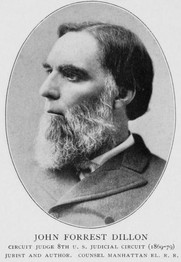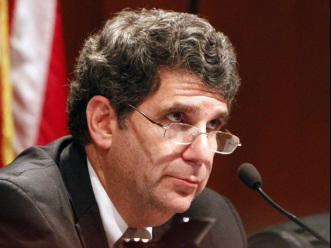Local governments are not sovereign entities. The US Constitution never mentions local governments. Under the 10th Amendment the power to determine the scope of authority of local governments is among the powers “reserved to the States”. Also reserved to the respective states is the right to define the relationship between that state and its local governments.
States can generally be classified as either Dillon Rule states or Home Rule states.
States can generally be classified as either Dillon Rule states or Home Rule states.
Dillon's RUle

The Dillon Rule doctrine is derived from John Forrest Dillon (1831-1914), Chief Justice of the Iowa Supreme Court, in decisions emanating during the June term in 1868:
“The true view is this: Municipal corporations owe their origin to, and derive their powers and rights wholly from the legislature. It breathes into them the breath of life, without which they cannot exist. As it creates, so may it destroy. If it may destroy; it may abridge and control. Unless there is some constitutional limitation on the right, the legislature might, by single act, if we can suppose it capable of so great a folly and so great a wrong, sweep from existence all of the municipal corporations in the state, and the corporation could not prevent it. … They are, so to phrase it, the mere tenants at will of the legislature” (City of Clinton v. Cedar Rapids and Missouri Railroad Company)
“It is a general and undisputed proposition of law that a municipal corporation possesses and can exercise the following powers, and no others: first, those granted in express words; second, those necessarily or fairly implied in or incident to the powers expressly granted; third, those essential to the accomplishment of the declared objects and purposes of the corporation—not simply convenient, but indispensable. Any fair, reasonable, substantial doubt concerning the existence of power is resolved by the courts against the corporation, and the power is denied.” (Merriam v Moody’s Executors)
Thirty-nine states apply Dillon's Rule - 31 to all localities and eight more to selected localities. Only 10 states do not subscribe to Dillon's Rule at all.
“The true view is this: Municipal corporations owe their origin to, and derive their powers and rights wholly from the legislature. It breathes into them the breath of life, without which they cannot exist. As it creates, so may it destroy. If it may destroy; it may abridge and control. Unless there is some constitutional limitation on the right, the legislature might, by single act, if we can suppose it capable of so great a folly and so great a wrong, sweep from existence all of the municipal corporations in the state, and the corporation could not prevent it. … They are, so to phrase it, the mere tenants at will of the legislature” (City of Clinton v. Cedar Rapids and Missouri Railroad Company)
“It is a general and undisputed proposition of law that a municipal corporation possesses and can exercise the following powers, and no others: first, those granted in express words; second, those necessarily or fairly implied in or incident to the powers expressly granted; third, those essential to the accomplishment of the declared objects and purposes of the corporation—not simply convenient, but indispensable. Any fair, reasonable, substantial doubt concerning the existence of power is resolved by the courts against the corporation, and the power is denied.” (Merriam v Moody’s Executors)
Thirty-nine states apply Dillon's Rule - 31 to all localities and eight more to selected localities. Only 10 states do not subscribe to Dillon's Rule at all.
Dillon's Rule in Virginia
The legal principle is ultra vires which means “outside one’s powers”. In a nutshell, it states that local governments are limited to the powers expressly granted to them by their state.
Three key tenets of the Dillon Rule:
•Those powers explicitly granted them by the legislature
•Those powers necessarily or fairly implied from a specific grant of power
•Those powers that are essential and indispensable to the existence of government
Virginia Supreme Court in Tabler v. Fairfax County said, “Virginia follows the Dillon Rule of strict construction concerning the legislative powers of local governing bodies. The Dillon Rule provides that local governing bodies have only those powers that are expressly granted, those that are necessarily or fairly implied from expressly granted powers and those that are essential and indispensable.”
Three key tenets of the Dillon Rule:
•Those powers explicitly granted them by the legislature
•Those powers necessarily or fairly implied from a specific grant of power
•Those powers that are essential and indispensable to the existence of government
Virginia Supreme Court in Tabler v. Fairfax County said, “Virginia follows the Dillon Rule of strict construction concerning the legislative powers of local governing bodies. The Dillon Rule provides that local governing bodies have only those powers that are expressly granted, those that are necessarily or fairly implied from expressly granted powers and those that are essential and indispensable.”
home rule

Under Home Rule, local governments may exercise all authority not specifically prohibited by the state constitution or law.
Municipal (city/town) charters convey ‘home rule’-like authority to Virginia cities and towns. A charter is the municipal equivalent of a constitution
Virginia is a Dillon Rule state but U.S. Advisory Commission on Intergovernmental Relations (ACIR) ranked the 50 states according to the amount of autonomy possessed by each state’s local governments – Virginia ranked 8th.
Municipal (city/town) charters convey ‘home rule’-like authority to Virginia cities and towns. A charter is the municipal equivalent of a constitution
Virginia is a Dillon Rule state but U.S. Advisory Commission on Intergovernmental Relations (ACIR) ranked the 50 states according to the amount of autonomy possessed by each state’s local governments – Virginia ranked 8th.
For more information
| dillon_rule_article.pdf | |
| File Size: | 23 kb |
| File Type: | |